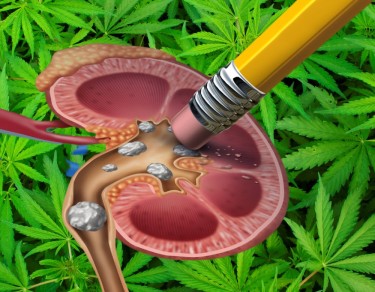
A recent study by Chinese researchers explored the connection between kidney stone occurrence in male cannabis users and non-users. The findings indicated that male cannabis users were inversely associated with kidney stones. This study was published in the journal Frontiers in Pharmacology.
Kidney stones, also known as renal calculi, nephrolithiasis, or urolithiasis, have been documented in human history for thousands of years. These solid formations composed of minerals and salt develop in the kidneys and may traverse a person’s urinary tract.
Passing a kidney stone can be excruciatingly painful, but typically, they do not result in permanent damage as long as they are promptly identified. Some people with kidney stones might need pain medicine and lots of water to pass the stone. But sometimes, the stone can get stuck in the pee tube, and surgery is needed to remove it.
Kidney stones are more common in men than in women. But other things can increase your chances of getting kidney stones, like your family history, not drinking enough water, your exercise habits, your diet, and having stomach problems.
Is There a Connection Between Kidney Stones and Cannabis Use?
To explore the potential correlation between cannabis usage and the occurrence of kidney stones, a group of Chinese researchers conducted a study involving a representative sample of over 14,000 individuals aged 20 to 59 in the United States.
Data for this investigation were drawn from the National Health and Nutrition Examination Survey from 2009 to 2018. Information on kidney stone prevalence and cannabis consumption was collected through self-report questionnaires.
The researchers employed multivariate logistic regression and conducted multiple sensitivity analyses to investigate the relationship between cannabis use and the risk of kidney stone development.
Notably, they emphasized that their study was the first cross-sectional analysis to probe the connection between cannabis use and kidney stone risk using population-based data.
“Our results indicate that in males, marijuana usage exhibited an inverse correlation with the occurrence of kidney stones,” the authors asserted. “Moreover, our study revealed that regular marijuana use (less than six times per week) displayed an adverse association with kidney stones among males. However, these distinctions were not observed in the general population or among females.”
The authors acknowledge that the limited availability and accessibility of cannabis in numerous countries have resulted in a lack of existing data on the relationship between cannabis use and medical conditions. Nonetheless, the researchers propose a potential explanation for this situation.
Cannabis Use Might Act as a Preventative Measure Against Kidney Stone Formation in Males
Researchers present a hypothesis explaining the potential link between cannabis use and reduced kidney stone rates. The study cites previous research, which has shown that cannabinoid application increased urine production without impacting excretion.
This suggests that the diuretic properties of cannabinoids, which aid in preventing the buildup of substances, could potentially shorten the duration during which crystals remain in the kidney, subsequently lowering the risk of kidney stone formation, as noted by the researchers.
Moreover, researchers explain that cannabidiol, a key part of cannabis, offers advantages by reducing inflammation and acting as an antioxidant. They also mention that when crystals form in the kidney, it’s connected to producing harmful reactive oxygen molecules and inflammation triggers. Therefore, it’s suggested that cannabidiol may have natural benefits in calming down inflammation and lessening oxidative stress.
What Is The Situation Regarding Female Cannabis Users?
Given that the study established that there is “no discernible link between marijuana use and kidney stones in females,” the researchers propose the hypothesis that hormonal levels may not be a governing factor in this connection.
They also draw attention to a previous study that suggested that reduced urinary saturation of crystals prone to forming stones “might contribute to the lower occurrence of kidney stones in females,” implying that estrogen could be associated with a decreased risk of kidney stones. Interestingly, postmenopausal females had a heightened risk of developing kidney stones.
“It is postulated that estrogen may overshadow the impact of marijuana use on kidney stones. Consequently, the association between marijuana use and the risk of kidney stones in the female population may be insufficient,” the researchers conclude.
The results warrant further investigation into the specific dosages and types of cannabis concerning kidney stones. The researchers conclude that collectively, their findings imply that consistent marijuana use in males is linked to a reduced risk of kidney stones. Furthermore, marijuana use at a frequency of one to six times per week exhibits an inverse association with the risk of kidney stones in males.
Conclusion
The investigation led by Chinese researchers illuminates the intriguing link between cannabis consumption and the occurrence of kidney stones, primarily within the male demographic. Although the results imply an inverse correlation between frequent marijuana use and kidney stones in males, this link was not evident in the general population or among females.
The study prompts inquiries into the potential role of cannabis and its constituents, including cannabidiol, in reducing the risk of kidney stones. Furthermore, the study highlights the potential influence of hormonal factors in kidney stone development, with estrogen seemingly offering protective effects for females.
This investigation underscores the importance of future research to delve deeper into the specific doses and types of cannabis that may affect kidney stone formation. As medical and recreational cannabis use becomes more prevalent, understanding its potential impact on health conditions like kidney stones is of growing significance.
These findings encourage further exploration into the nuanced interplay between cannabis and kidney stone development, hoping to provide more comprehensive insights into this intricate relationship.
KIDNEYS AND CANNABIS, READ ON…
CANNABIS DOES NO HARM TO YOUR KIDNEYS SAY DOCTORS!
- SEO Powered Content & PR Distribution. Get Amplified Today.
- PlatoData.Network Vertical Generative Ai. Empower Yourself. Access Here.
- PlatoAiStream. Web3 Intelligence. Knowledge Amplified. Access Here.
- PlatoESG. Carbon, CleanTech, Energy, Environment, Solar, Waste Management. Access Here.
- PlatoHealth. Biotech and Clinical Trials Intelligence. Access Here.
- Source: http://cannabis.net/blog/medical/got-stones-cannabis-can-lower-the-risk-of-kidney-stones-in-men-says-new-medical-study




